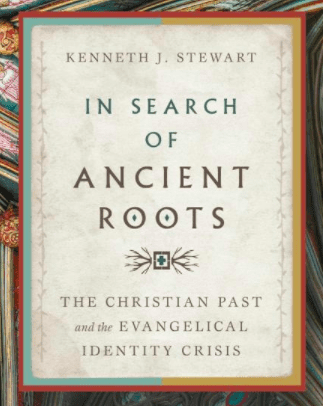Chapter six in Kenneth Stewart’s In Search of Ancient Roots: The Christian Past and the Evangelical Identity Crisis is worth the price of the book, perhaps twice that amount.
In Search of Ancient Roots: The Christian Past and the Evangelical Identity Crisis is worth the price of the book, perhaps twice that amount.
Why?
The big picture is that those who turn to Roman Catholicism or to Eastern Orthodoxy almost certainly turned in those directions as a result of reading about the 2d Century — the patristics, the so-called apostolic fathers, or the post-apostolic writings — in translations composed by Protestants, some of whom are far closer to evangelicalism or who are evangelicals.
Furthermore, the revival of interest in the patristics did not derive from Roman Catholic scholars or leaders but from Renaissance and Protestants. Those are some big claims, but Stewart’s got the evidence on his side. (We still know that mid 20th Century evangelicalism avoided the patristics and evangelical cultures were largely unaffected by the patristics.)
Here we go… some specifics.
First, it is true that major converts openly stated that in Anglicanism, Catholicism or Orthodoxy they got in touch with 2d Century roots: Thomas Howard, Peter Gillquist, Robert Webber and Michael Harper.
Second, in the late medieval period the patristics were every bit as neglected as they are today by many forms of evangelicalism. The pursuit of the sources (ad fontes) was the result of Renaissance thinkers and Christian humanists, like Jacques Lefevre de’Etaples and some Catholics opposed pressing the patristics for too much.
Third, and this was the surprising part of the chapter for me: Irish Protestant clergyman James Ussher may be the most important figure in putting the patristics back on the table. He showed early versions of major Protestant themes, provoked the monepiscopacy debate all over again (showing that later developments were far beyond what was occurring in the 2d Century), that only seven letters of Ignatius are authentic … that is, the “foremost authority in Europe on Ignatius” was a Protestant, not a Catholic.
Fourth, then comes JB Lightfoot who established the historical veracity of the patristics in his establishment of the historical veracity of the New Testament, and he did this fighting the Tübingen School.
Finally, one major scholar after another on the apostolic fathers were Protestants: Kirsopp Lake, E.J. Goodspeed, Robert Grant, and Michael Holmes.
Key conclusion: the patristics have never been the property of the Roman Catholics or even the Eastern Orthodox.
The idea that leaving evangelicalism to find the apostolic fathers or patristics is Romanticism, not history.
But what we need is a generation of evangelicals educated as leaders by learning the patristics. The collapse of Trinitarian thinking in Grudem and Ware, and others, occurred because of the collapse of patristic education.











